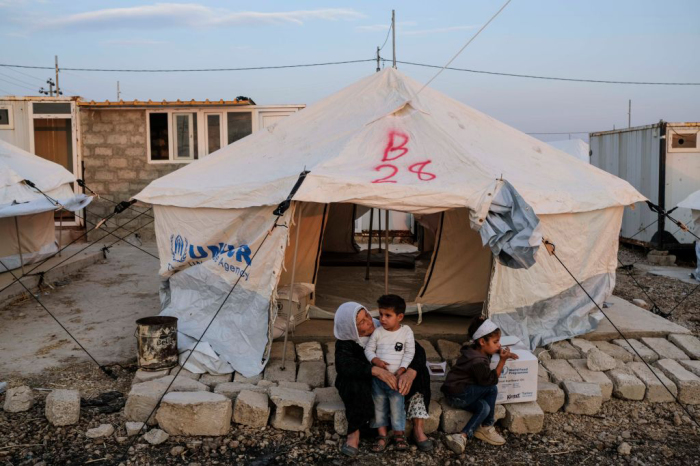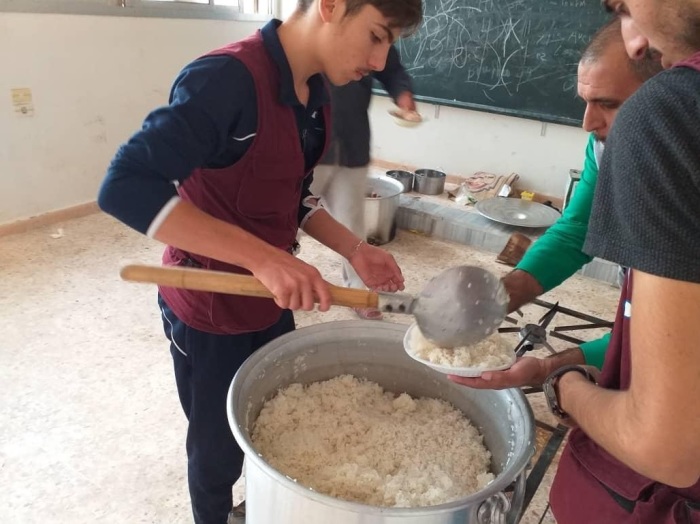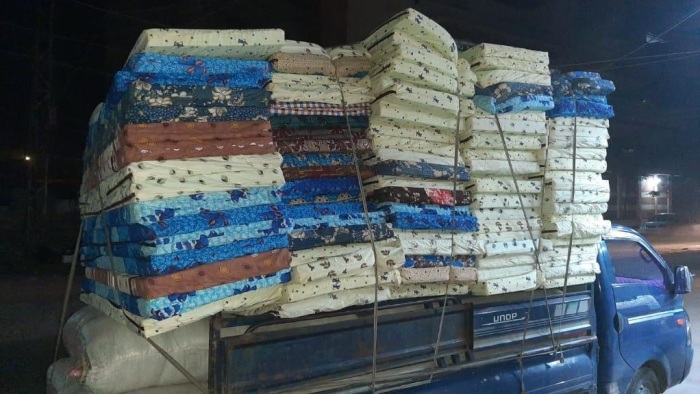Christian NGO opens 58 food distribution centers to aid civilians fleeing war-torn northern Syria

A United States-based Christian humanitarian agency says it's feeding around 10,000 people a day in war-torn northeastern Syria as local workers and volunteers put their lives on the line to serve those in need following the Turkish invasion this month.
Partners Relief & Development, a Michigan-based nonprofit founded in 1994 serving in a handful of conflicts around the world, has been on the ground in northeastern Syria since 2016 and helped establish five schools and two health clinics in a post-Islamic State Syria.
However, the progress made in these communities located in an autonomous region defended by the Syrian Democratic Forces (largely made up of Kurdish YPG forces) over the last three years has now been called into question amid the Turkish campaign along a 300-mile-long strip of land along the border.
Since the cross-border campaign began on Oct. 9, hundreds of thousands of civilians in cities along the Turkish-Syrian border have fled from their homes. Turkey has claimed that its campaign is targeting “terrorists” linked to Kurdish separatists in Turkey but supporters have refuted such a label.
In response to the mass exodus, Partners Relief & Development has established at least 58 food centers offering warm meals (curry and rice) around the city of Hasakah, a town where many displaced civilians in border towns are resettling.
The feeding centers are set up in temporary shelters, most of which are schools, where food is cooked and distributed.
In addition, the nongovernmental organization is distributing blankets, sleeping mats, diapers, baby formula, hygiene supplies, cooking supplies, gas stoves and other essential supplies for the fleeing civilians.

The NGO says it has delivered relief to at least 76,010 Kurdish civilians who have fled from their homes in the last month.
“Our team works where politics or violence prevents children from having the things that they need to survive,” Partners Relief & Development founder and President Steve Gumaer told The Christian Post, noting that the organization also operates in Myanmar and Bangladesh.
“And once they have those things, we also stay long enough to establish schools and healthcare for them, which is what we were doing in Kurdish Syria before these attacks began.”

In 2016, Partners began working with the Kurdish people on the Syrian side of the border to make education and healthcare available to those trying to restart their lives following the Islamic State’s yearslong reign of terror in the region.
Partner’s second health clinic opened last month in the former Islamic State de-facto capital of Raqqa.
“The Kurds are sort of our last really great friends in the Middle East and the ones who are in alignment with our values of democracy and freedom,” Gumaer said.
Things were relatively peaceful under the Kurdish autonomous control, Gumaer said, until President Recep Tayyip Erdoğan planned a military offensive that led to the pullback of 50 U.S. soldiers from the area which enabled Turkey to invade Syria.
The Trump administration's move was widely criticized across the political spectrum as critics argued that the U.S. had once again abandoned the Kurds, who the U.S. military was helping in the fight against the Islamic State.
“Our team members and their families are facing the violence of a modern army, Turkey,” Gumaer said. “And they're afraid for their lives and they're moving and running to get away from the act of violence.”
Gumaer explained that most of the Partners’ team members on the ground in northeastern Syria are based in the city of Qamishli. The city served as an administration center for the Kurdish population but lies on the Turkish border.
Qamishli is one of the border towns that has come under shelling and suffered the loss of innocent life. Thousands in Qamishli have fled into the villages and countryside south of the city.
“Our team is in touch with us every day,” Gumaer said. “And this is the second time that our team leader — the one coordinating all our work — started crying and saying that he is not sure how this is going to turn out. He's dealing with people shooting at them and artillery and all of the violence of war in the context of trying to help fleeing civilians while his family's still up and Qamishli.”
In Syria, Partners has one full-time team leader who is Kurdish and 75 team members who are paid at daily rates.
Last week, Gumaer said Partners team members were shot by a newly-formed Turkish-backed militia while in the town of Tel Tamer providing aid to fleeing civilians.
“They had to hurry out of there. No one got hurt but that's the context of what we're dealing with now as opposed to a week ago when there was largely peace and physical security,” Gumaer said. “[Security] used to be predictable before the United States pulled out.”
In Hasakah, Gumaer said that many displaced people are finding places to stay with friends or family, while others are taking shelter in public buildings that have not been destroyed. Others, he said, are sleeping in their cars or finding places under rubble.
In a video posted to Facebook, the organization warned civilians and even children have been killed, while medics, casualty collection points and hospitals had been targeted.
“We remain deeply concerned for our Kurdish friends,” they say in the video. “We fear that even those who escape death may never be able to return to their homes.”
As Turkey’s five-day ceasefire agreement signed last week with the United States comes to a close, Erdogan has secured a deal with Russian President Vladimir Putin to jointly remove Kurdish fighters from a buffer zone on the border.
On Wednesday, Trump said in a speech at the White House that as part of the permanent ceasefire, the U.S. has dropped sanctions against Turkey.
According to AFP, Turkey has seized control of a “safe zone” inside Syria that is about 75 miles long and 20 miles deep. Under the agreement with Russia, the safe zone will be preserved between the towns of Tal Abyad and Ras al-Ain.
Starting on Wednesday, Russian and Syrian authorities will “facilitate the removal” of Kurdish fighters within 18 miles of the border.
Gumaer disagrees with Turkey’s claim that the YPG militants are “terrorists.”
“The Kurds under attack right now or anything but terrorists. They demonstrated that in their fight against terrorism in support of the United States,” he said. “It's a fiction to say that they are terrorists. There are nuances and there are some complexities to that. But to keep it simple: they're just not terrorists. It's not right to call them that."
Follow Samuel Smith on Twitter: @IamSamSmith
or Facebook: SamuelSmithCP




























